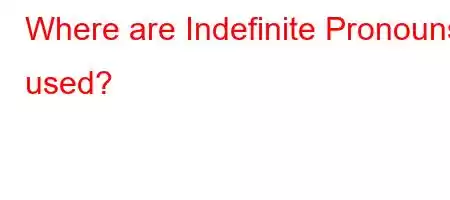Guidelines Where are Indefinite Pronouns used?
Contents
Where are Indefinite Pronouns used?
The Turkish equivalent of Indefinite pronouns are indefinite pronouns. Indefinite pronouns are used in place of names of people, objects and places that are unclear, unknown, or not the main focus of the sentence.
Where is Anybody used?
► Anybody is also used as a subject, but then any means one.
Definite What does indefinite mean?
Then "definite" and "indefinite" should be related to "precision". While the word meaning of "definite" was "certain, within certain limits", the word "indefinite" was formed with the suffix "in", which caused loss of meaning, and gained the opposite meaning, that is, "indefinite, unlimited".
< p>Where is No one used?NO (one/body, thing, where): It means “no one”, “nothing”, “nowhere”. They are used in positive sentence structures, but their meaning is negative. It can only be used instead of subject in interrogative sentences, it does not act as an object.
Is everyone singular or plural?
Everybody are happy. The word everybody is taken as a plural in some languages. This may lead us to use the verb in the plural form incorrectly. In fact, everybody (along with somebody, nobody, and anybody) is a singular noun and therefore requires a singular verb conjugation.
Is everybody plural?
Nobody is used in what sentences?
ex: is there anybody outside? Nobody is in plain sentences or in those short sentences of those who say they are now making short sentences. There is no difference if anybody is used in a negative sentence. however, anybody means “any person” when used in a positive sentence.
What does Definite indefinite article mean?
“The” definite article means “any person” a-an” indefinite article ie ambiguous without borders. In summary, every singular noun takes "a-an" unless it has a definite meaning that requires "the".
What does definite article mean in English?What do I mean by specific, determined? Namely: if we have already talked about a person, a place, and both of the speakers are aware of the name in question, it becomes a known, specific name. In such cases, we use "definite article", that is, "the".
How to use No one?How to use One of the?
One of; It means “one” and is used with the singular verb. – One of the boys was ill. (One of the children was sick.) – One of them was waiting for you. (One of them was waiting for you.)
Read: 199


